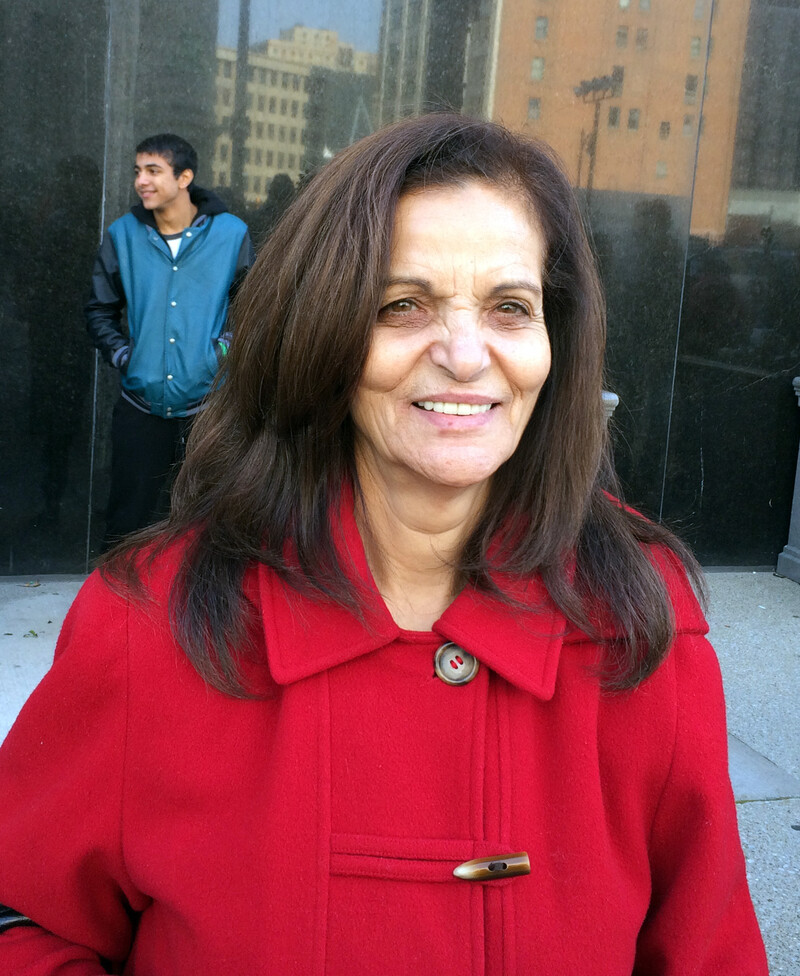7 December 2016

Rasmea Odeh
Rasmea Odeh will have a new trial in January.
In a written decision on Tuesday, US District Judge Gerswhin Drain swept aside the objections by US government prosecutors to clinical psychologist and torture expert Dr. Mary Fabri’s credibility as an expert witness.
His decision was issued a week after a hearing on the matter was scheduled to take place but cancelled by Drain at the last minute.
In November 2014, a jury found 69-year-old Palestinian American community leader Rasmea Odeh guilty of immigration fraud after a week-long trial in federal court in Detroit.
In March 2015, Drain sentenced Odeh to 18 months in prison, which she would serve before being stripped of her citizenship and deported.
In February 2016, the Sixth Circuit Court of Appeals ruled that Drain had erred by barring Fabri or Odeh from testifying during the trial about Odeh’s post-traumatic stress disorder (PTSD) as part of her defense.
Prosecutors had argued against allowing for a new trial with Fabri’s testimony, asserting that it would be irrelevant and that Fabri was not qualified.
But Drain refuted each of the government’s arguments, at one point describing them as “puzzling.”
His decision clears the way for a new trial, scheduled to begin in a month.
Fishing expedition
In October 2013, federal prosecutors indicted Odeh, associate director of the Chicago nonprofit the Arab American Action Network, for unlawful procurement of naturalization, nine years after she became a US citizen and just one year short of the statute of limitations.
The indictment followed 2010 FBI raids on the homes of community and political activists in Chicago and other cities, leading to the subpoena of Arab American Action Network records. Six years after the raids and subpoenas to about two dozen individuals, no indictments have ever been filed against any of the original targets.
Though Odeh was not one of the original subjects of the broad investigation, her 45-year-old record from Israel was discovered in thousands of documents the US government obtained from Israeli authorities.
In 1969 Odeh was convicted by an Israeli military court of helping to coordinate a series of bombings in Jerusalem that killed two young men. She served 10 years in Israeli prison before being released in a prisoner exchange.
Odeh’s lawyers have maintained that she was convicted based on a confession that followed prolonged torture.
When Odeh filled out an application for US citizenship in 2004, she answered “No” to a series of questions asking if she had “ever” been arrested, charged, convicted or imprisoned.
Torture expert and psychologist, Dr. Mary Fabri examined Odeh over the course of several months in 2014 and concluded that Odeh suffers from PTSD as a result of torture, including rape, by Israeli interrogators nearly 50 years ago.
Based on that examination, Fabri believes Odeh could have filtered out the traumatic memories when she filled out her immigration and naturalization applications.
Odeh’s legal team is arguing that as a result of her PTSD she understood the questions to be asking whether she had any criminal record in the United States.
Succesful appeal
In Odeh’s first trial, Judge Drain refused to allow the defendant to mention her torture or PTSD in court.
A federal appeals court disagreed with Drain’s restrictions on Odeh’s defense, holding that Fabri’s testimony is “potentially admissible because it is relevant to whether Odeh knew that her statements were false, which is an element of a prosecution.”
“Because the government must prove every element of a crime beyond a reasonable doubt … a defendant’s right to present a defense ‘generally includes the right to the admission of competent, reliable, exculpatory evidence’ to negate an element of the offense,” the appeal court stated.
In his decision on Tuesday, Drain agreed, writing that Fabri’s testimony “will assist the jury in determining whether defendant’s PTSD affected her memory when she filled out the naturalization application and whether she knowingly lied when she answered ‘No’ to questions asking if she had ‘EVER’ been arrested, charged, convicted or imprisoned.”
The US Attorney’s office in Detroit says prosecutors are ready to present their case at trial. “The new trial is to allow Ms. Odeh the opportunity to present an expert witness,” spokesperson Gina Balaya said. “It does not change our view or position on the case.”
“This is incredible news,” Nesreen Hasan of the Rasmea Defense Committee, a community support group, said. “The government has gone to great lengths to cover up the details of Israel’s torture and crimes against this mentor of mine and of so many others, this Palestinian icon. Now, the truth will finally be told in open court.”






Comments
Free Rasmea Odeh
Permalink tom hall replied on
This is indeed good news. Congratulations to Rasmea Odeh, her legal team and many supporters. Hope now increases that with the admission of previously barred testimony she will be cleared and released. Incidentally, handing down this decision must have galled trial judge Gershwin Drain, who did everything in his power to ensure Rasmea's unfair conviction. He was virtually ordered to rule in the defendant's favor by the federal appeals court which found his conduct unacceptable. But if he's assigned to hear the case again, our voices should be raised long and loud. He's shown his prejudice in this matter and must be replaced.